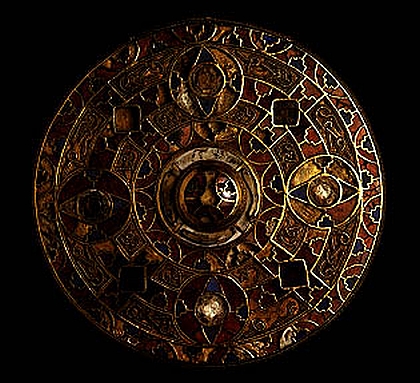
Heald þ? n?, hr?se, //n? hæleð ne m?ston,
eorla æhte. //Hwæt! hit ær on þ?
g?de bege?ton;//g?ð-d?að fornam,
feorh-bealo fr?cne//fyra gehwylcne,
l?oda m?nra, þ?ra þe þis l?f ofgeaf,
ges?won sele-dr?am.//N?h hw? sweord wege
oððe fetige//fæted wæge,
drync-fæt d?ore://duguð ellor sc?c.
Sceal se hearda helm//hyrsted golde
fætum befeallen://feormiend swefað,
þ? þe beado-gr?man//bywan sceoldon,
g? swylce s?o here-p?d,//s?o æt hilde geb?d
ofer borda gebræc//bite ?rena,
brosnað æfter beorne.//Ne mæg byrnan hring
æfter w?g-fruman//w?de f?ran
hæleðum be healfe;//næs hearpan wyn,
gomen gl?o-b?ames,//n? g?d hafoc
geond sæl swingeð,//n? se swifta mearh
burh-stede b?ateð.//Bealo-cwealm hafað
fela feorh-cynna//feorr onsended!
Now do thou, O Earth, hold fast what heroes might not,—the possessions of nobles. Lo! Brave men won it at first from thee; death in war, horrid carnage, took away every one of my tribe who yielded up this life; they saw [the last of] festive joy. I have no one to bear the sword, or to burnish the plated flagon, the precious drinking-cup; the noble warriors have departed to another place. Now will the hard helmet, bedight with gold, be deprived of its adornments; they sleep who should burnish the battle-masks. The armour too, which stood the stroke of swords in battle, mid the crash of shields, perishes as does the fighter; nor may the ringed mail fare far and wide with the warrior, side by side with mighty men. There is no joy of harp, no pastime with the gladdening lute; no good hawk sweeps through the hall, nor does the swift steed paw the courtyard. Baleful death has banished hence many of the human race.
—Beowulf, Lay of the Last Survivor, passage starting at l. 2248 (7th cen. CE)(J.R. Clark Hall & C.L. Wrenn transls. 1950)
This is the first literary text in what evolved into the English language. It is less alien when you make the substitution for the Old English letters no longer in use: thorn, þ, and eth, ð–the two different versions of what became the distinctively Anglo-Saxon consonant “th.” In the practice of the time, lines are broken by a caesura, which is reflected here by “//”.
Listen to the quoted passage being read in Old English here.


